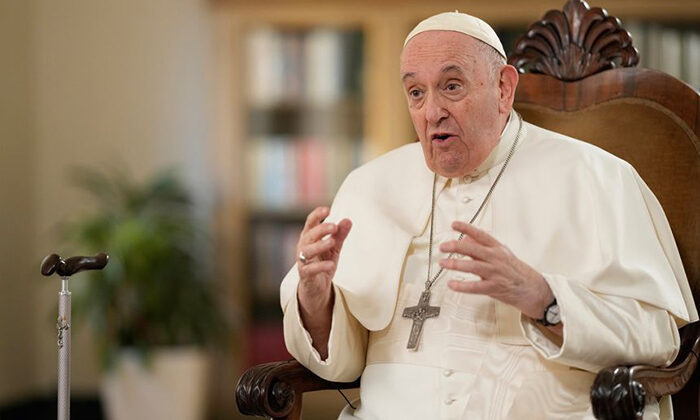
Pope Francis discussed homosexuality during an interview with the Associated Press at the Vatican. PHOTO: ANDREW MEDICHINI/ASSOCIATED PRESS
Pope Francis said in an interview this week that while homosexuality is sinful, countries should not criminalize homosexual practices.
In an interview with The Associated Press Tuesday, Pope Francis acknowledged that homosexuality is a “sin” while stressing the importance of distinguishing “between sin and crime.”
“Being homosexual is not a crime,” the pontiff said.
“We are all children of God, and God loves us as we are and for the strength that each of us has to fight for our dignity,” he added.
Addressing the distinction between sin and crime, Francis asked: “It’s also a sin to lack charity with one another, so what about that?”
Noting that dozens of countries criminalize homosexual behavior and several classify homosexual practices as a death penalty offense, the pope described such laws as “unfair.” He argued that the Catholic Church must advocate against such laws.
Data compiled by Human Rights Watch shows that 67 countries, primarily located in Africa, Asia, Eastern Europe and small island countries in the Caribbean and Pacific, outlaw same-sex relations. Countries where homosexual acts are punishable by the death penalty include Brunei, Iran, Mauritania, Nigeria, Qatar, Saudi Arabia and Yemen.
Francis’ comments mark the latest example of the Bishop of Rome calling for a welcoming stance towards those with same-sex attraction while declining to change the denomination’s teachings that marriage is a union between a man and a woman and that homosexuality is a sin.
In 2020, Francis expressed support for a “civil union law,” stating in a documentary that “Homosexual people have a right to be in a family.”
“They are children of God and have a right to a family,” he said. “Nobody should be thrown out or be made miserable over it.”
After his remarks generated pushback, the Vatican clarified that “Pope Francis was referring to particular state regulations, certainly not the doctrine of the church, which he has reaffirmed numerous times over the years.”
The following year, the Vatican’s Congregation for the Doctrine of the Faith released a statement affirming the Catholic Church’s teaching on marriage, proclaiming that “it is not licit to impart a blessing on relationships, or partnerships, even stable, that involve sexual activity outside of marriage.”
The statement, issued in response to a question about whether or not Catholic churches had the power to bless same-sex unions, indicated that “positive elements” in “unions between persons of the same sex” cannot “justify these relationships and render them legitimate objects of an ecclesial blessing, since the positive elements exist within the context of a union not ordered to the Creator’s plan.”
Last year, Pope Francis delivered a message to “parents who are facing their children’s problems,” specifically “parents who see different sexual orientations in their children.” The pontiff told parents of children with same-sex attraction to “accompany their children and not hide in an attitude of condemnation.”
The Catechism of the Catholic Church, which contains the Catholic Church’s official teachings, describes homosexual acts as “intrinsically disordered” and “contrary to the natural law.” According to the catechism, because homosexual acts “close the sexual act to the gift of life” and “do not proceed from a genuine affective and sexual complementarity,” “under no circumstances can they be approved.”
The denomination calls on those experiencing same-sex attraction to practice “chastity,” as must “all the baptized” regardless of their sexual orientation. The catechism includes rhetoric similar to Francis’ comments about refraining from condemnation, asserting that persons with same-sex attraction “must be accepted with respect, compassion, and sensitivity.” Additionally, the catechism advises that “every sign of unjust discrimination in their regard should be avoided.”
Reporting by The Christian Post

